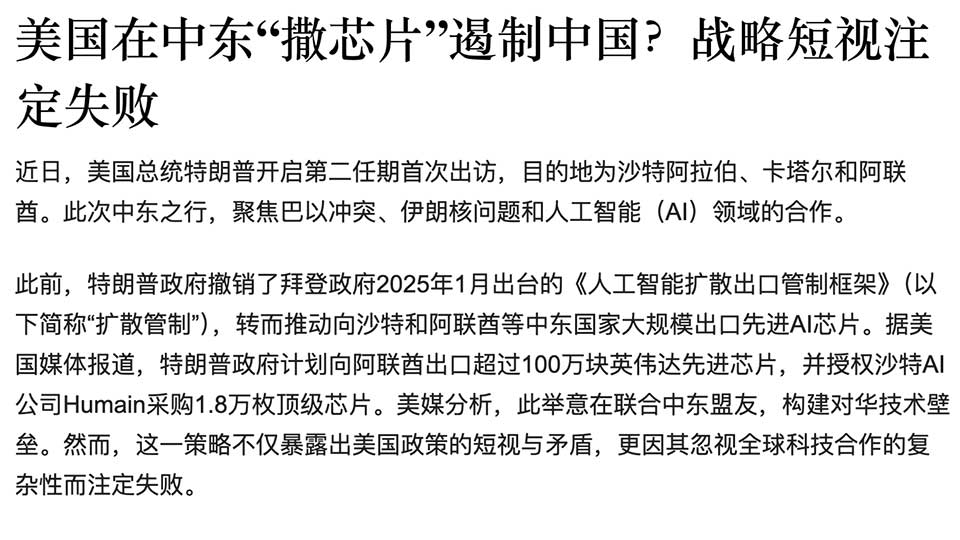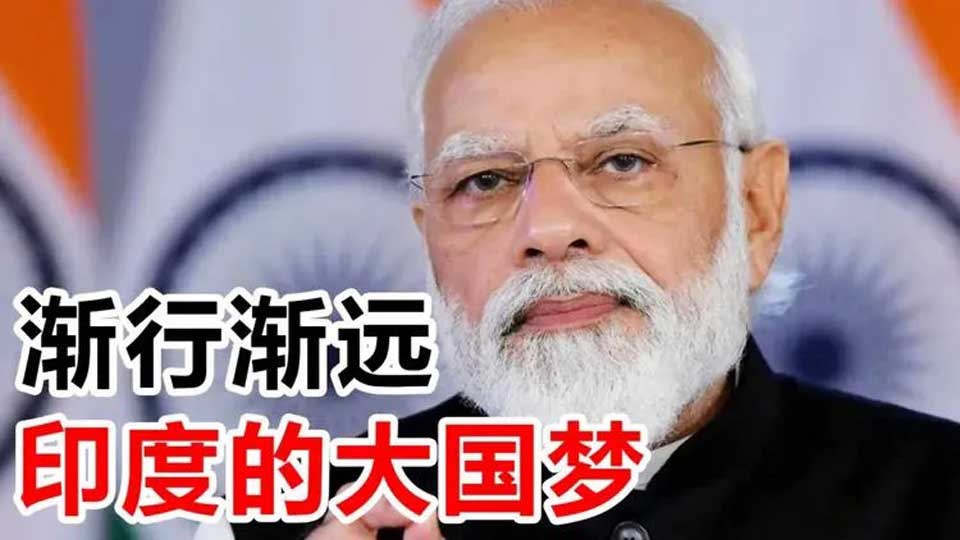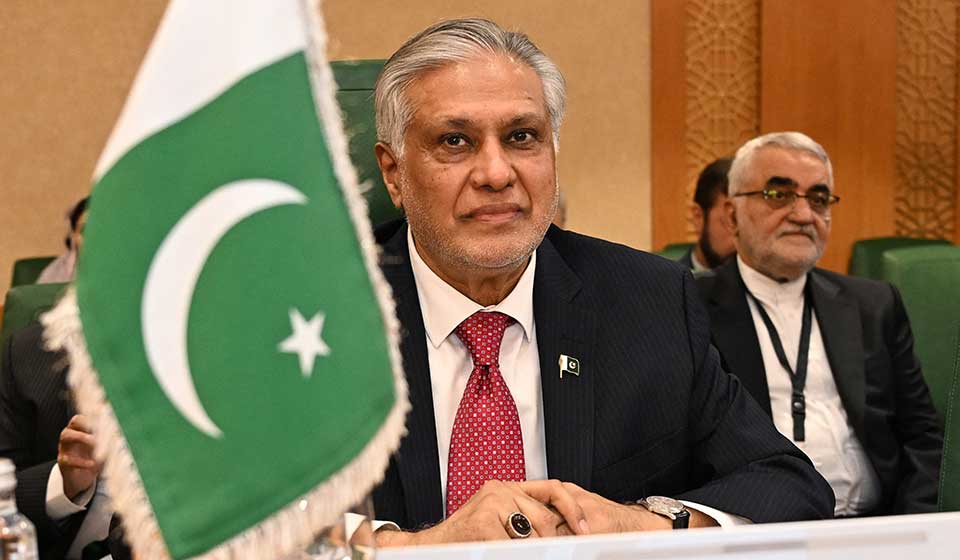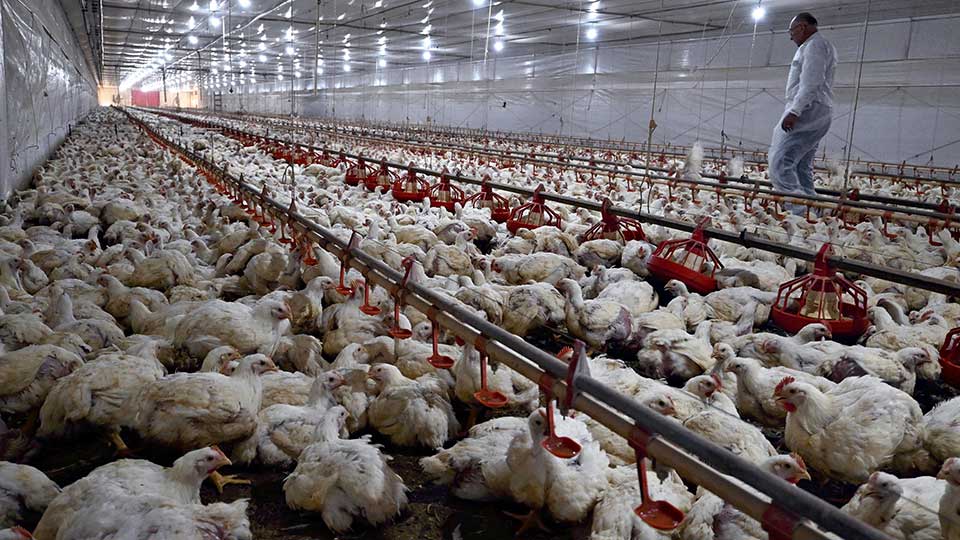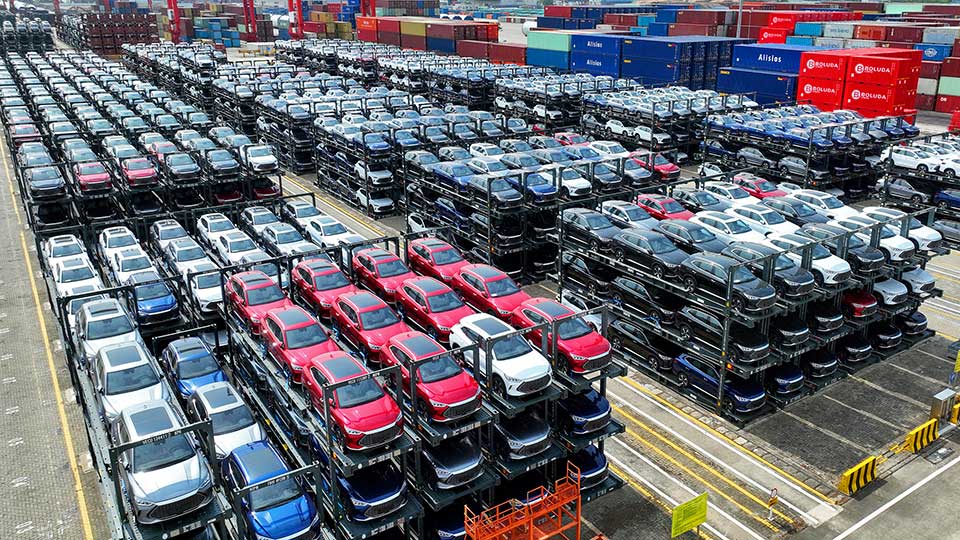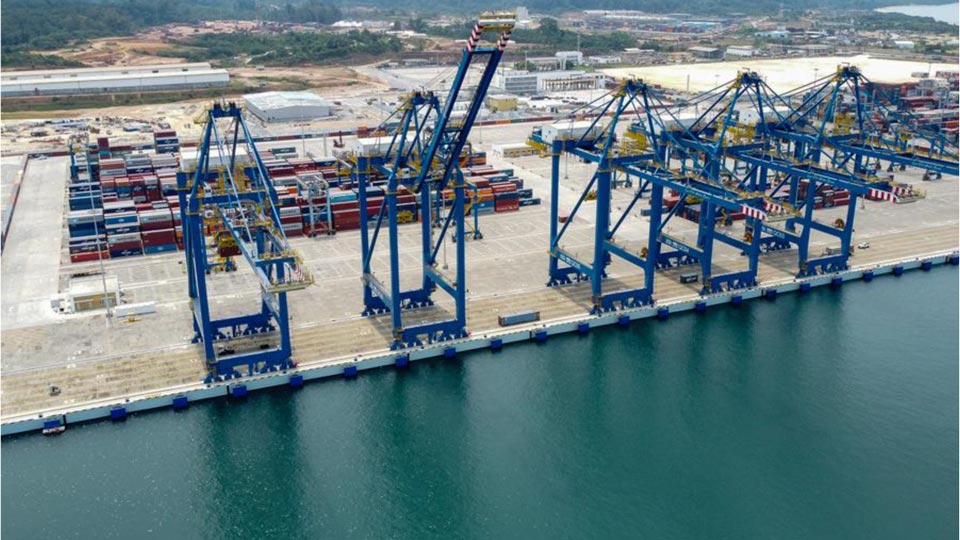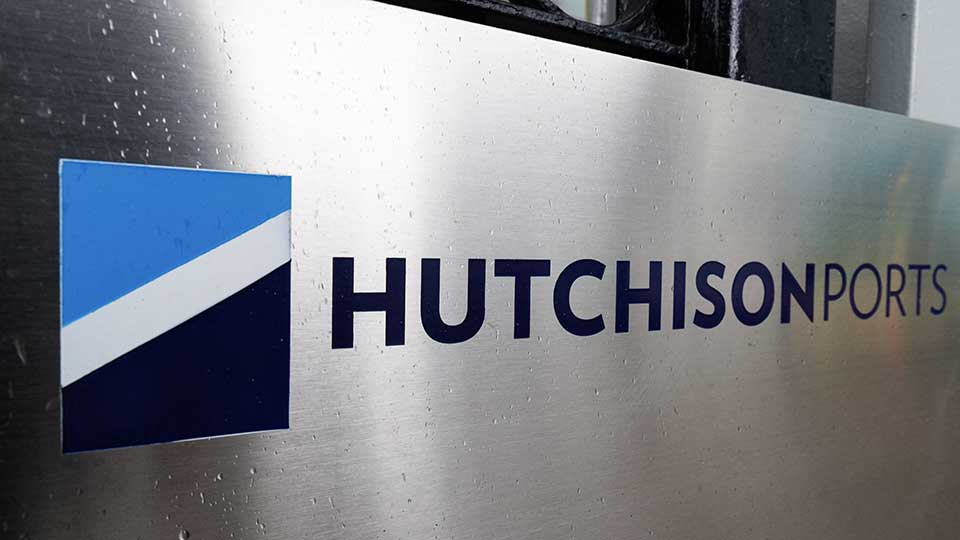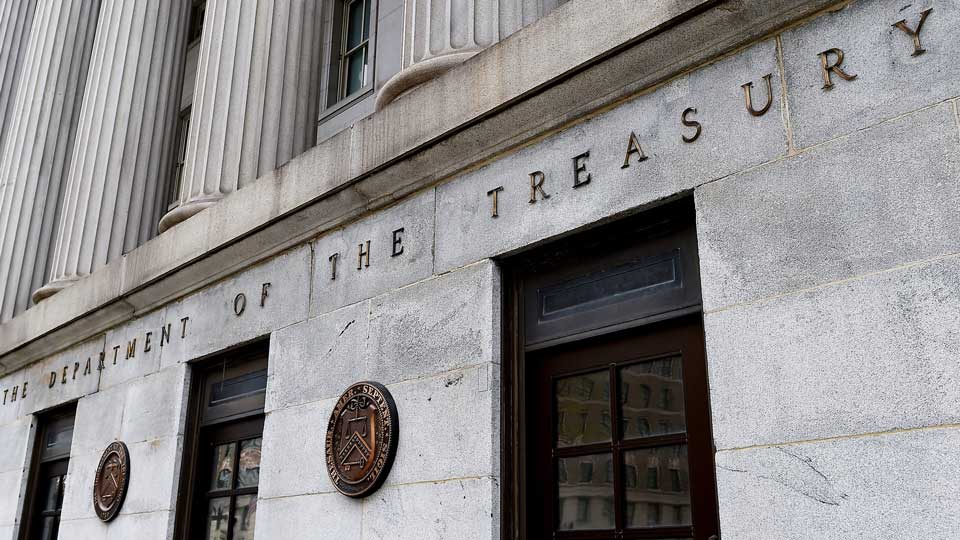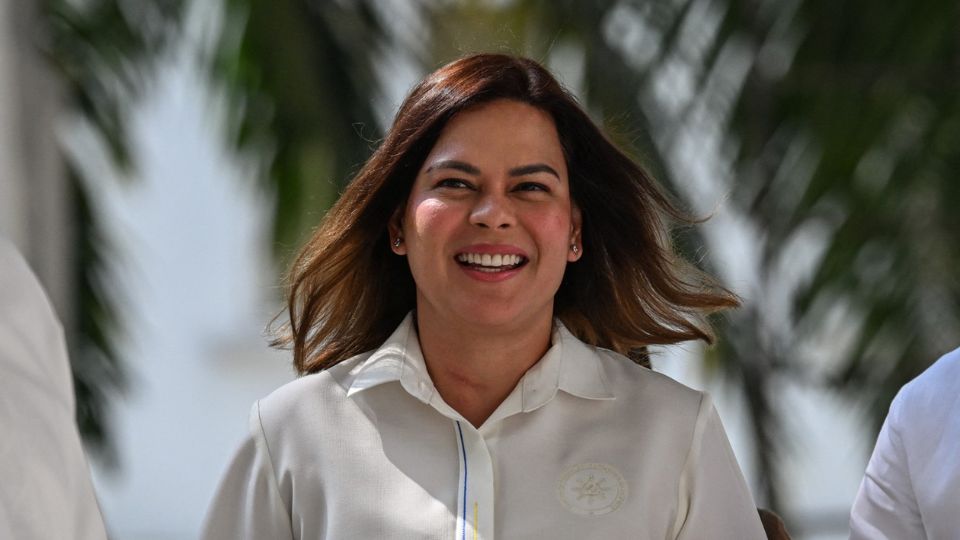Live Feed
The News Feed is curated by CGSP’s editors in Asia and Africa.
U.S. “Chip Dumping” in Middle East Is Paying China’s Way, Chinese Analysts Say
Chinese Netizen Mocks India’s Attempt to Emulate Beijing’s Tariff Standoff with U.S.
Chinese Netizen Mocks India’s Attempt to Emulate Beijing’s Tariff Standoff with U.S.
Pakistan FM to Visit China on Heels of Conflict With India Over Kashmir
Pakistan FM to Visit China on Heels of Conflict With India Over Kashmir
Australian Firm Produces Heavy Rare Earth, First Outside China
Australian Firm Produces Heavy Rare Earth, First Outside China
China, EU Suspend Brazil Chicken Imports Over Bird Flu
China, EU Suspend Brazil Chicken Imports Over Bird Flu
Chinese EV BYD Dethroned Toyota in Singapore 2025 Car Sales, Signals EV Shift
Chinese EV BYD Dethroned Toyota in Singapore 2025 Car Sales, Signals EV Shift
WEEK IN REVIEW: Trump Administration Warns on Using Huawei AI
WEEK IN REVIEW: Trump Administration Warns on Using Huawei AI
With Chinese Backing, Cameroon Opens Second Phase of Kribi Deep-Sea Port
With Chinese Backing, Cameroon Opens Second Phase of Kribi Deep-Sea Port
China warns Panama ports deal firms to ‘proceed with caution’
China warns Panama ports deal firms to ‘proceed with caution’
Vietnam Criticizes China–Cambodia Joint Military Drills, Citing Regional Stability
Vietnam has expressed concern over the commencement of “Golden Dragon 2025,” the largest joint military drill between China and Cambodia, calling on all countries to uphold international law and contribute to peace in the region.
“We believe that relevant countries need to make positive contributions to peace, security, stability, and prosperity of the region and the world in accordance with the international practice, international law, and the fundamental principles of the United Nations Charter,” said Vietnamese Foreign Ministry spokesperson Pham Thu Hằng on May 15.
The comments came a day after Cambodia and China launched the two-week military exercise, which involved thousands of troops and advanced technology systems across multiple locations.
Joint Exercises Launch with Advanced Weaponry
Golden Dragon 2025 officially began yesterday and is scheduled to run until May 28. The drills involve over 2,000 military personnel from the Royal Cambodian Armed Forces (RCAF) and China's People’s Liberation Army (PLA).
This year’s iteration includes coordinated operations across the army, navy, and air force branches.
Cambodia’s Ministry of National Defence states that deployed assets include helicopters, warships, reconnaissance and attack drones, robotic dogs, surgical robots, armored vehicles, and artificial intelligence-powered communications and surveillance tools in the joint military drills.
The Royal Cambodian Armed Forces and China’s People’s Liberation Army are holding the drills at two primary sites: Phnom Chum Sen Rikreay in Kampong Chhnang province and Preah Sihanouk province on Cambodia’s southern coast.
Cambodia Says Drills Focused on Counterterrorism, Humanitarian Relief
The stated theme of this year’s Golden Dragon exercise is “Joint Counter-Terrorism Operations and Humanitarian Relief.”
Cambodian defense officials say the drills are designed to build combat readiness and enhance mutual understanding between the two militaries.
“This year’s exercise demonstrates the traditional friendship between Cambodia and China and supports the modernization of the Royal Cambodian Armed Forces,” said General Chhum Sucheat, spokesperson for Cambodia’s Ministry of National Defence.
General Thong Solimo, spokesperson for the RCAF, reiterated the non-aggressive intent of the exercises. “We conduct this exercise only to exchange experiences, strengthen our ability to defend ourselves, and be able to participate in building peace in the region and the world,” he told the Associated Press.
Regional Reactions and Strategic Context
Golden Dragon drills began in 2016, the same year Cambodia canceled its annual Angkor Sentinel joint exercises with the United States.
Since then, Cambodia has deepened its defense and economic ties with Beijing, becoming one of China’s closest partners in mainland Southeast Asia.
While avoiding any direct mention of China, Vietnam's statement reflects Hanoi's long-standing concerns over Beijing’s influence on its neighbors and the broader strategic balance in Southeast Asia.
Meanwhile, the U.S. has sought to reengage Phnom Penh. In recent months, several senior U.S. civilian and military officials have visited Cambodia, and officials in Phnom Penh have expressed interest in resuming military cooperation with Washington.
Xi Jinping’s April Visit Reinforced Military Ties
The military exercise comes weeks after Chinese President Xi Jinping’s state visit to Cambodia in April 2025.
During the visit, both governments reaffirmed their commitment to building a “community of shared destiny,” a term frequently used in China’s foreign policy to signal deep, long-term strategic alignment.
Cambodia has consistently stated that its cooperation with China does not come at the expense of other partnerships. Still, the timing and scope of Golden Dragon 2025 have drawn regional attention.
Vietnam Criticizes China–Cambodia Joint Military Drills, Citing Regional Stability
Vietnam has expressed concern over the commencement of “Golden Dragon 2025,” the largest joint military drill between China and Cambodia, calling on all countries to uphold international law and contribute to peace in the region.
“We believe that relevant countries need to make positive contributions to peace, security, stability, and prosperity of the region and the world in accordance with the international practice, international law, and the fundamental principles of the United Nations Charter,” said Vietnamese Foreign Ministry spokesperson Pham Thu Hằng on May 15.
The comments came a day after Cambodia and China launched the two-week military exercise, which involved thousands of troops and advanced technology systems across multiple locations.
Joint Exercises Launch with Advanced Weaponry
Golden Dragon 2025 officially began yesterday and is scheduled to run until May 28. The drills involve over 2,000 military personnel from the Royal Cambodian Armed Forces (RCAF) and China's People’s Liberation Army (PLA).
This year’s iteration includes coordinated operations across the army, navy, and air force branches.
Cambodia’s Ministry of National Defence states that deployed assets include helicopters, warships, reconnaissance and attack drones, robotic dogs, surgical robots, armored vehicles, and artificial intelligence-powered communications and surveillance tools in the joint military drills.
The Royal Cambodian Armed Forces and China’s People’s Liberation Army are holding the drills at two primary sites: Phnom Chum Sen Rikreay in Kampong Chhnang province and Preah Sihanouk province on Cambodia’s southern coast.
Cambodia Says Drills Focused on Counterterrorism, Humanitarian Relief
The stated theme of this year’s Golden Dragon exercise is “Joint Counter-Terrorism Operations and Humanitarian Relief.”
Cambodian defense officials say the drills are designed to build combat readiness and enhance mutual understanding between the two militaries.
“This year’s exercise demonstrates the traditional friendship between Cambodia and China and supports the modernization of the Royal Cambodian Armed Forces,” said General Chhum Sucheat, spokesperson for Cambodia’s Ministry of National Defence.
General Thong Solimo, spokesperson for the RCAF, reiterated the non-aggressive intent of the exercises. “We conduct this exercise only to exchange experiences, strengthen our ability to defend ourselves, and be able to participate in building peace in the region and the world,” he told the Associated Press.
Regional Reactions and Strategic Context
Golden Dragon drills began in 2016, the same year Cambodia canceled its annual Angkor Sentinel joint exercises with the United States.
Since then, Cambodia has deepened its defense and economic ties with Beijing, becoming one of China’s closest partners in mainland Southeast Asia.
While avoiding any direct mention of China, Vietnam's statement reflects Hanoi's long-standing concerns over Beijing’s influence on its neighbors and the broader strategic balance in Southeast Asia.
Meanwhile, the U.S. has sought to reengage Phnom Penh. In recent months, several senior U.S. civilian and military officials have visited Cambodia, and officials in Phnom Penh have expressed interest in resuming military cooperation with Washington.
Xi Jinping’s April Visit Reinforced Military Ties
The military exercise comes weeks after Chinese President Xi Jinping’s state visit to Cambodia in April 2025.
During the visit, both governments reaffirmed their commitment to building a “community of shared destiny,” a term frequently used in China’s foreign policy to signal deep, long-term strategic alignment.
Cambodia has consistently stated that its cooperation with China does not come at the expense of other partnerships. Still, the timing and scope of Golden Dragon 2025 have drawn regional attention.
Vietnam Slams China’s Fishing Ban in Disputed Waters as Illegal
Vietnam has formally protested China’s latest imposition of an annual fishing ban in the South China Sea, which Vietnam refers to as the East Sea.
The country states that the unilateral move violates its sovereignty and contravenes international maritime law.
Hanoi maintains that the ban, which overlaps with areas it claims as its exclusive economic zone, disrupts peace and stability in one of the world’s most contested maritime regions.
Vietnam’s Diplomatic Response: Sovereignty, UNCLOS, and Legal Rights
Speaking at a press briefing on Thursday, Pham Thu Hang, spokesperson for Vietnam’s Ministry of Foreign Affairs, stated, “Vietnam demands China to respect its sovereignty over Hoang Sa (Paracel), as well as its sovereignty, sovereign rights and jurisdiction over territorial waters established in line with the 1982 United Nations Convention on the Law of the Sea.”
She confirmed that Vietnam had delivered a diplomatic note to the Chinese Embassy in Hanoi formally rejecting the fishing ban.
The ministry also urged China to avoid actions that could complicate the situation.
It emphasized that Vietnamese fishermen had the legal right to operate within Vietnam’s maritime zones and international waters under UNCLOS.
China’s Justification: Resource Conservation and Enforcement History
The ban generally applies to areas north of the 12th parallel, including waters near the Paracel Islands and parts of the Gulf of Tonkin.
However, the scope of the ban overlaps with maritime areas claimed by Vietnam and other Southeast Asian states, raising regular diplomatic protests.
Domestic Measures: Vietnam Urges Fishermen to Maintain Operations
Vietnam’s Ministry of Agriculture and Rural Development declared the Chinese ban “invalid” under international law and Vietnamese sovereignty, and instructed coastal provinces to advise fishermen to maintain normal operations within Vietnamese maritime zones.
Fishermen were encouraged to organize into groups for safety and mutual assistance during offshore expeditions.
The ministry also warned of possible vessel detentions by Chinese maritime authorities and instructed local governments to remain alert, document any foreign actions within Vietnamese waters, and report them to relevant agencies.
Disputed Waters: A Flashpoint in the South China Sea Dispute
The South China Sea is a strategic waterway rich in marine resources and a key route for global trade.
Multiple countries, including Vietnam, the Philippines, Malaysia, Brunei, and Taiwan, dispute China’s expansive claims delineated by its “nine-dash line.”
In 2016, a Permanent Court of Arbitration ruling in The Hague rejected the legal basis of many of China’s assertions, though Beijing does not recognize the verdict.
Southeast Asian nations, including Vietnam, assert their maritime rights based on the 1982 United Nations Convention on the Law of the Sea (UNCLOS), which defines maritime zones such as exclusive economic zones (EEZs) and continental shelves.
Vietnam Slams China’s Fishing Ban in Disputed Waters as Illegal
Vietnam has formally protested China’s latest imposition of an annual fishing ban in the South China Sea, which Vietnam refers to as the East Sea.
The country states that the unilateral move violates its sovereignty and contravenes international maritime law.
Hanoi maintains that the ban, which overlaps with areas it claims as its exclusive economic zone, disrupts peace and stability in one of the world’s most contested maritime regions.
Vietnam’s Diplomatic Response: Sovereignty, UNCLOS, and Legal Rights
Speaking at a press briefing on Thursday, Pham Thu Hang, spokesperson for Vietnam’s Ministry of Foreign Affairs, stated, “Vietnam demands China to respect its sovereignty over Hoang Sa (Paracel), as well as its sovereignty, sovereign rights and jurisdiction over territorial waters established in line with the 1982 United Nations Convention on the Law of the Sea.”
She confirmed that Vietnam had delivered a diplomatic note to the Chinese Embassy in Hanoi formally rejecting the fishing ban.
The ministry also urged China to avoid actions that could complicate the situation.
It emphasized that Vietnamese fishermen had the legal right to operate within Vietnam’s maritime zones and international waters under UNCLOS.
China’s Justification: Resource Conservation and Enforcement History
The ban generally applies to areas north of the 12th parallel, including waters near the Paracel Islands and parts of the Gulf of Tonkin.
However, the scope of the ban overlaps with maritime areas claimed by Vietnam and other Southeast Asian states, raising regular diplomatic protests.
Domestic Measures: Vietnam Urges Fishermen to Maintain Operations
Vietnam’s Ministry of Agriculture and Rural Development declared the Chinese ban “invalid” under international law and Vietnamese sovereignty, and instructed coastal provinces to advise fishermen to maintain normal operations within Vietnamese maritime zones.
Fishermen were encouraged to organize into groups for safety and mutual assistance during offshore expeditions.
The ministry also warned of possible vessel detentions by Chinese maritime authorities and instructed local governments to remain alert, document any foreign actions within Vietnamese waters, and report them to relevant agencies.
Disputed Waters: A Flashpoint in the South China Sea Dispute
The South China Sea is a strategic waterway rich in marine resources and a key route for global trade.
Multiple countries, including Vietnam, the Philippines, Malaysia, Brunei, and Taiwan, dispute China’s expansive claims delineated by its “nine-dash line.”
In 2016, a Permanent Court of Arbitration ruling in The Hague rejected the legal basis of many of China’s assertions, though Beijing does not recognize the verdict.
Southeast Asian nations, including Vietnam, assert their maritime rights based on the 1982 United Nations Convention on the Law of the Sea (UNCLOS), which defines maritime zones such as exclusive economic zones (EEZs) and continental shelves.
Ruto’s “New World Order” Comment Triggers U.S. Senator
US Senator and the chairperson of the Senate Foreign Relations Committee, Jim Risch, lashed out at Kenya’s President William Ruto for comments made during his trip to China in April.
In a speech [PDF] at Peking University, Ruto said much of the world’s development financing and governance architectures are out of date and don’t serve the continent. He called for a more inclusive global governance order, saying: “Kenya and China are not merely trade partners; we are co-architects of a new world order – one that is fair, inclusive, and sustainable.”
In his opening statement to the Committee, Sen. Risch said:
“Many African nations maintain troubling ties with China — including key national security partners. Just last month, President Ruto declared that Kenya, a major non-NATO ally, and China are “co-architects of a new world order.” That’s not just alignment to China; it’s allegiance [...] Relying on leaders who embrace Beijing so openly is an error. It’s time to reassess our relationship with Kenya and others who forge tight bonds with China.”
WHY IS THIS IMPORTANT? The comments coincided with the State Department’s announcement that U.S. President Trump will lead an African leaders’ summit later this year, and that “it will prioritize exchange between partners and relations between equals.” It exposes the tension between the U.S.’s outreach to the continent and the Trump administration’s wider attempts to pressure countries for their China ties. China is Africa’s largest trading partner.
Ruto’s “New World Order” Comment Triggers U.S. Senator
US Senator and the chairperson of the Senate Foreign Relations Committee, Jim Risch, lashed out at Kenya’s President William Ruto for comments made during his trip to China in April.
In a speech [PDF] at Peking University, Ruto said much of the world’s development financing and governance architectures are out of date and don’t serve the continent. He called for a more inclusive global governance order, saying: “Kenya and China are not merely trade partners; we are co-architects of a new world order – one that is fair, inclusive, and sustainable.”
In his opening statement to the Committee, Sen. Risch said:
“Many African nations maintain troubling ties with China — including key national security partners. Just last month, President Ruto declared that Kenya, a major non-NATO ally, and China are “co-architects of a new world order.” That’s not just alignment to China; it’s allegiance [...] Relying on leaders who embrace Beijing so openly is an error. It’s time to reassess our relationship with Kenya and others who forge tight bonds with China.”
WHY IS THIS IMPORTANT? The comments coincided with the State Department’s announcement that U.S. President Trump will lead an African leaders’ summit later this year, and that “it will prioritize exchange between partners and relations between equals.” It exposes the tension between the U.S.’s outreach to the continent and the Trump administration’s wider attempts to pressure countries for their China ties. China is Africa’s largest trading partner.
APEC Trade Ministers Meet in South Korea Amid U.S.-China Trade Tensions
By Julien Girault and Hieun Shin
Trade ministers from the top economies that make up the Asia-Pacific Economic Cooperation, or APEC, began a two-day meeting in South Korea's Jeju island on Thursday, as trade cooperation falters globally.
US President Donald Trump's tariffs and trade war with China has shaken the export-dependent Asia-Pacific region, and countries were vying to meet the U.S. representative for trade talks on the sidelines of the summit.
What is APEC?
The 21-member APEC group includes Australia, Indonesia, Vietnam, China, Russia, Japan, the United States, Canada, Mexico and Chile.
Established in 1989, it aims to promote regional integration and economic cooperation.
APEC members account for around 37 percent of the global population, 60 percent of the world's GDP and nearly half of global trade.
But it has been unable to exert meaningful political influence in the face of Trump's tariffs, which have hit Asian economies hard.
"APEC has always struggled to show relevance," said Deborah Elms, a trade analyst at the Hinrich Foundation, describing the group as an incubator for "non-binding ideas".
Does It Matter?
"Growing uncertainties are placing a strain on the global economy and trade landscape," said South Korea's Trade Minister Cheong In-kyo in his opening speech.
Experts say that now is the moment for the group to prove its worth, as trade tensions escalate along with increasing tariff disputes.
"The APEC has never been more important," said Christopher Findlay, an honorary public policy professor at the Australian National University.
In the face of Trump's tariffs, "APEC's role in articulating the continuing relevance of economic integration -- and how to get there -- is more important than ever," he added.
What's Happening to Regional Trade?
Asian nations are "increasingly tied to China, both from a final demand perspective and via integrated supply chains", even as companies relocate to countries like Vietnam to avoid US tariffs, Katrina Ell, an economist at Moody's Analytics, told AFP.
Yet the "US still remains a critical and large final destination for goods... making (Asian countries) vulnerable to the chaotic US trade policy because it relies on demand from the US consumer," she said.
The organisation's experts now expect a meager 0.4 percent growth in exports for the Asia-Pacific region this year, a sharp slowdown from the 5.7 percent surge in 2024.
Despite their varied economic strengths and development levels, experts say that APEC members share a common interest in defending free trade.
What Can Jeju Offer?
"I hope today's meeting will lay a solid foundation for dialogue and collaboration to overcome the political and economic challenges as well as uncertainties that we encounter," said South Korea's minister Cheong.
The Trump administration's protectionist moves are "an important stimulant for bilateral and multilateral negotiations outside of the US", added Moody's economist Ell.
"Economies outside of the US have been scrambling to cement closer ties with each other, recognising that the benefits of free trade have not been forgotten."
However, she warned that Asian consumption, even if growing, "cannot completely replace US demand".
What About the United States?
It is one of US Trade Representative Greer's first international trips since taking office, and the Jeju meeting is likely to be "a critical platform for tariff negotiations beyond APEC", Korean officials have said.
APEC trade ministers were hurrying to meet Greer as he entered the opening ceremony, AFP reporters saw.
Kim Dae-jong, a professor at Sejong University, told AFP that "numerous negotiations could take place", particularly between South Korean and US officials.
South Korean government officials told AFP that industry minister Ahn Duk-geun is expected to meet Greer on Friday.
Will There be Trade Deals? -
Even a series of bilateral tariff talks between the United States and its partners would be significant, experts say.
Greer met Chinese international trade representative Li Chenggang on Thursday on the sidelines of the summit, according to South Korean officials, who did not provide further details.
But agreements on broader cooperation within APEC may be hindered not just by Trump's trade war, but by other ongoing tensions between the United States and China, as well as Russia.
"I don't think the meeting will produce a clear outcome," warned Kim Yong-jin, a professor at Sogang University.
It is more likely to result in "in a general message of cooperation" without substantive deals.
Even agreeing on the rules of the game would be a step forward.
"The important thing is for ministers to agree on a rational approach," said Kim. "But the United States seems focused solely on the trade deficit."
APEC Trade Ministers Meet in South Korea Amid U.S.-China Trade Tensions
By Julien Girault and Hieun Shin
Trade ministers from the top economies that make up the Asia-Pacific Economic Cooperation, or APEC, began a two-day meeting in South Korea's Jeju island on Thursday, as trade cooperation falters globally.
US President Donald Trump's tariffs and trade war with China has shaken the export-dependent Asia-Pacific region, and countries were vying to meet the U.S. representative for trade talks on the sidelines of the summit.
What is APEC?
The 21-member APEC group includes Australia, Indonesia, Vietnam, China, Russia, Japan, the United States, Canada, Mexico and Chile.
Established in 1989, it aims to promote regional integration and economic cooperation.
APEC members account for around 37 percent of the global population, 60 percent of the world's GDP and nearly half of global trade.
But it has been unable to exert meaningful political influence in the face of Trump's tariffs, which have hit Asian economies hard.
"APEC has always struggled to show relevance," said Deborah Elms, a trade analyst at the Hinrich Foundation, describing the group as an incubator for "non-binding ideas".
Does It Matter?
"Growing uncertainties are placing a strain on the global economy and trade landscape," said South Korea's Trade Minister Cheong In-kyo in his opening speech.
Experts say that now is the moment for the group to prove its worth, as trade tensions escalate along with increasing tariff disputes.
"The APEC has never been more important," said Christopher Findlay, an honorary public policy professor at the Australian National University.
In the face of Trump's tariffs, "APEC's role in articulating the continuing relevance of economic integration -- and how to get there -- is more important than ever," he added.
What's Happening to Regional Trade?
Asian nations are "increasingly tied to China, both from a final demand perspective and via integrated supply chains", even as companies relocate to countries like Vietnam to avoid US tariffs, Katrina Ell, an economist at Moody's Analytics, told AFP.
Yet the "US still remains a critical and large final destination for goods... making (Asian countries) vulnerable to the chaotic US trade policy because it relies on demand from the US consumer," she said.
The organisation's experts now expect a meager 0.4 percent growth in exports for the Asia-Pacific region this year, a sharp slowdown from the 5.7 percent surge in 2024.
Despite their varied economic strengths and development levels, experts say that APEC members share a common interest in defending free trade.
What Can Jeju Offer?
"I hope today's meeting will lay a solid foundation for dialogue and collaboration to overcome the political and economic challenges as well as uncertainties that we encounter," said South Korea's minister Cheong.
The Trump administration's protectionist moves are "an important stimulant for bilateral and multilateral negotiations outside of the US", added Moody's economist Ell.
"Economies outside of the US have been scrambling to cement closer ties with each other, recognising that the benefits of free trade have not been forgotten."
However, she warned that Asian consumption, even if growing, "cannot completely replace US demand".
What About the United States?
It is one of US Trade Representative Greer's first international trips since taking office, and the Jeju meeting is likely to be "a critical platform for tariff negotiations beyond APEC", Korean officials have said.
APEC trade ministers were hurrying to meet Greer as he entered the opening ceremony, AFP reporters saw.
Kim Dae-jong, a professor at Sejong University, told AFP that "numerous negotiations could take place", particularly between South Korean and US officials.
South Korean government officials told AFP that industry minister Ahn Duk-geun is expected to meet Greer on Friday.
Will There be Trade Deals? -
Even a series of bilateral tariff talks between the United States and its partners would be significant, experts say.
Greer met Chinese international trade representative Li Chenggang on Thursday on the sidelines of the summit, according to South Korean officials, who did not provide further details.
But agreements on broader cooperation within APEC may be hindered not just by Trump's trade war, but by other ongoing tensions between the United States and China, as well as Russia.
"I don't think the meeting will produce a clear outcome," warned Kim Yong-jin, a professor at Sogang University.
It is more likely to result in "in a general message of cooperation" without substantive deals.
Even agreeing on the rules of the game would be a step forward.
"The important thing is for ministers to agree on a rational approach," said Kim. "But the United States seems focused solely on the trade deficit."
U.S. Sanctions Chinese, HK Firms for Aiding Iran’s Missile Program
U.S. Sanctions Chinese, HK Firms for Aiding Iran’s Missile Program
Spain Busts Lucrative Chinese-Arab Money Laundering Ring
Marcos Coalition Weakens in Philippine Midterm Election as China Policy Divides Campaign
Introducing CGSP Intelligence
CGSP Intelligence gives you the information advantage on Chinese activities in the Global South. CGSP Intelligence is launching in Summer 2025, with analysis and a full set of data tools designed for corporate and enterprise leaders.

